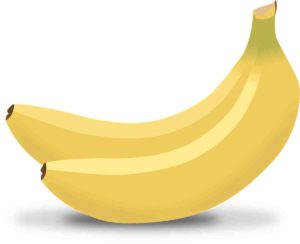Least Favorite ≠ Something you hate
Quick Answer
'Least favorite' describes something that you like, though you like it less than the other items that you like.
Explanation
Something that is among your favorites is something you like. Therefore, if you say something is your least favorite, it means that you like it, but less than all other things that you like.
For example, here are the fruits I like in order of how much I like them:
- apples
- blueberries
- strawberries
- bananas
In other words,...
- Apples are my favourite fruit.
- Bananas are my least favorite fruit.
Does this mean I don't like bananas? NO! They are still among my favorites.

Bananas are my least favorite, which still means they are among my favourites (technically).
How do I say that I dislike something the most? What is the opposite of favorite?
There is no perfect opposite for the word favourite/favorite, which is probably why people use 'least favorite' incorrectly. If you hate kiwis the most among all fruits, you can say these phrases:
- Kiwis are my most disliked fruit.
- Kiwis are the worst (fruit).
- I hate kiwis (the most).
Does it matter if it's technically wrong? (Prescriptivism vs Descriptivism Debate)
If you are a prescriptivist, you follow the rules of grammar and word use strictly, so you probably want to avoid using least favorite to describe something you dislike.
If you are a descriptivist, you recognize that language is used to communicate meaning. If people clearly understand that saying "Monday is my least favorite day" means that you dislike it the most, then there's no problem with using the term this way.
What's more important to you: staying consistent with the literal meaning of a term, or how effective the term is in communicating an idea? It's up to you to decide.
Notes on Spelling:
- 'Favorite' is the preferred spelling in the United States (AmE).
- 'Favourite' is the preferred spelling used in the United Kingdom (BrE) and commonwealth countries like Canada, Australia, and New Zealand
Questions? Did you find a mistake? Please leave a comment below.
-- Written by Matthew Barton of Englishcurrent.com

dear sir or madam
i am writing to request letter for your company.
To anyone learning English, there is nothing wrong with saying “least favorite” in place of “most hated”. People started saying it because it sounds nicer, and we don’t like children saying words like “hate”.
The author says we should use the term “dislike the most”, instead, but this is ridiculous because “dis-like” literally means “not like”. Logically, “not like” isn’t necessarily the same as “hate”. Just because someone doesn’t like video games, that doesn’t mean they hate video games. Maybe they’ve just never bothered with them. But when we English speakers say “I don’t like that”, we usually do mean “I hate that”. Again, it’s just nicer to say “don’t like” or “dislike”, instead of “hate”.
The only thing ‘wrong’ with it is that its literal meaning is nearly the opposite of what the speaker intends to say. Otherwise, idiomatically, it works, as the lesson states. Do you have a source for the idea that “People started saying it because it sounds nicer”? This page provides some historical reference to how the meaning of ‘least favorite’ changed from its literal meaning to a more iidiomatic/ironic one: https://www.grammarphobia.com/blog/2020/06/least-favorite.html